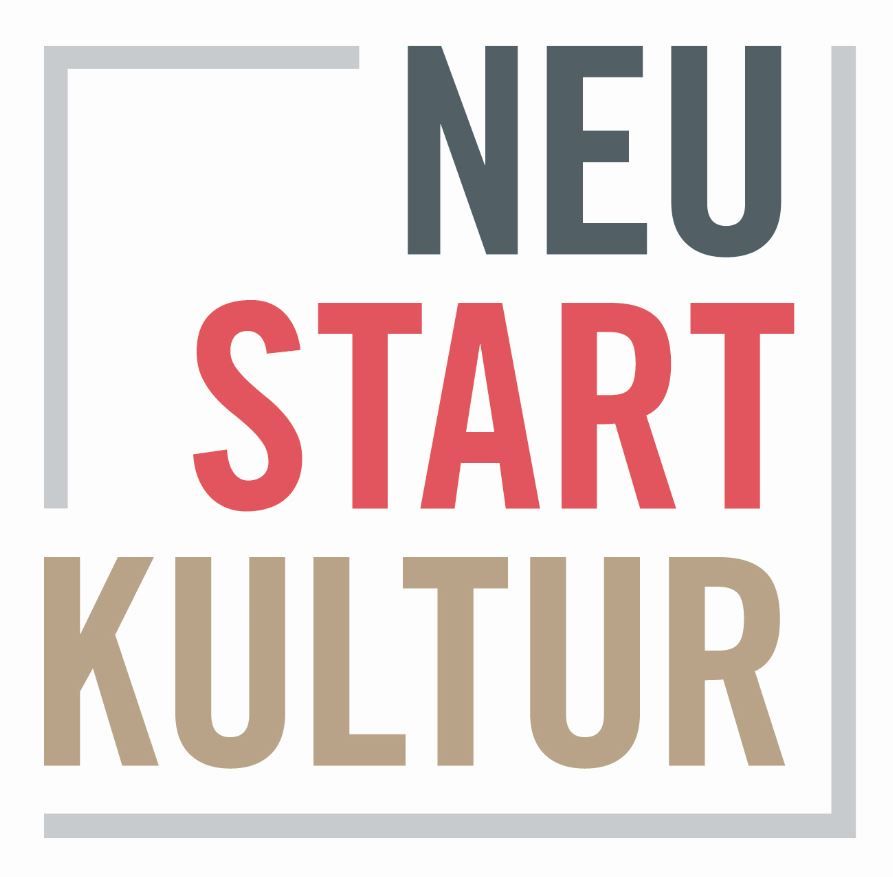HUNGRY
seven choreographic video-portraits
HUNGRY
HUNGRY

Photos: De-Da Productions
upcoming dates
KASSEL • Freitag 11.10. 17:00 • STUDIO LEV Werne-Hilpert-Straße 22 • Eintitt frei • all genders welcome
watch ‘hungry’
talk to us
eat with us
DE
Jeder Körper ist einzigartig. Dennoch verbinden uns körperliche Erfahrungen wie Hunger, Appetit, Verdauung, Erschöpfung und Anstrengungen genauso sowie Schönheitswahn, Körpernormen und Leistungsdruck. Sieben Tänzerinnen waren eingeladen, über die Beziehung zu ihrem eigenen Körper zu sprechen, sieben Tage wurden sie von der Kamera begleitet, während sie ihre jeweilige Geschichte tanzten. Tänzerinnen erzählen die Geschichten ihrer Körper: Sieben choreographische Video-Portraits über das Eine, was wir alle gemeinsam haben.
Die Videos von Tara, Katja, Hend, Maisie, Amelia, Magda und Yanel können hier auf unserer Seite weiter unten in voller Länge angeschaut werden.
EN
Every body is unique. Nevertheless, bodily experiences like hunger, appetite, digestion, fatigue and effort connect us as well as beauty-mania, body norms and pressure to perform. Seven dancers were invited to talk about their relationship to their own body, seven days they were accompanied by the camera while dancing their story. Dancers tell the stories of their bodies: Seven choreographic video-portraits about the one thing we all share.
The videos of Tara, Katja, Hend, Maisie, Amelia, Magda and Yanel can be watched in full length here on this website (scroll down).
LIVE-SCREENING - 14.01.2023, 20 Uhr
studioNAXOS, Waldschmidtstraße 19, 60316 Frankfurt am Main
TARA
TARA
DE
"Ich habe wirklich nichts zu verbergen. Was verberge ich?"
...
"Der vorpubertäre Körpertyp und geschlechtsspezifische Stereotypen, die idealisiert werden - das fand ich wirklich schwierig. Ich wollte dagegen rebellieren, weil ich von Natur aus nicht dazugehörte. Ich wollte so gut wie möglich werden, um dann dagegen zu rebellieren und einfach auf den Boden zu fallen, meine Füße zu verbiegen und meine Schuhe zu verbrennen, zu schreien und mir die Haare abzuschneiden!"
...
"Wenn ich da durch atmen könnte, könnte ich daran wachsen."
...
"Nackt auf der Bühne zu stehen ist eine der befreiendsten und konfrontierendsten Dinge, die ich je machen musste. Ich habe festgestellt, dass ich wirklich gegen diesen Teil von mir ankämpfen musste, der bestimmen wollte, wie die Leute mich sehen."
EN
“I have really nothing to hide. What am I hiding?”
…
"The prepubescent-look body type and gendered stereotypes that are idealized - I really found that difficult. I wanted to rebel against it, because I didn’t naturally belong. I wanted to get as good as I could so then I could rebel from it and just drop to the floor and flex my feet and burn my shoes, scream and cut my hair off!”
…
“If I could breathe through it, I could grow from it.”
...
“Being nude on stage is one of the most liberating and confronting things that I’ve had to do. I found that I really had to fight this part of me that wanted to shape how people saw me.”
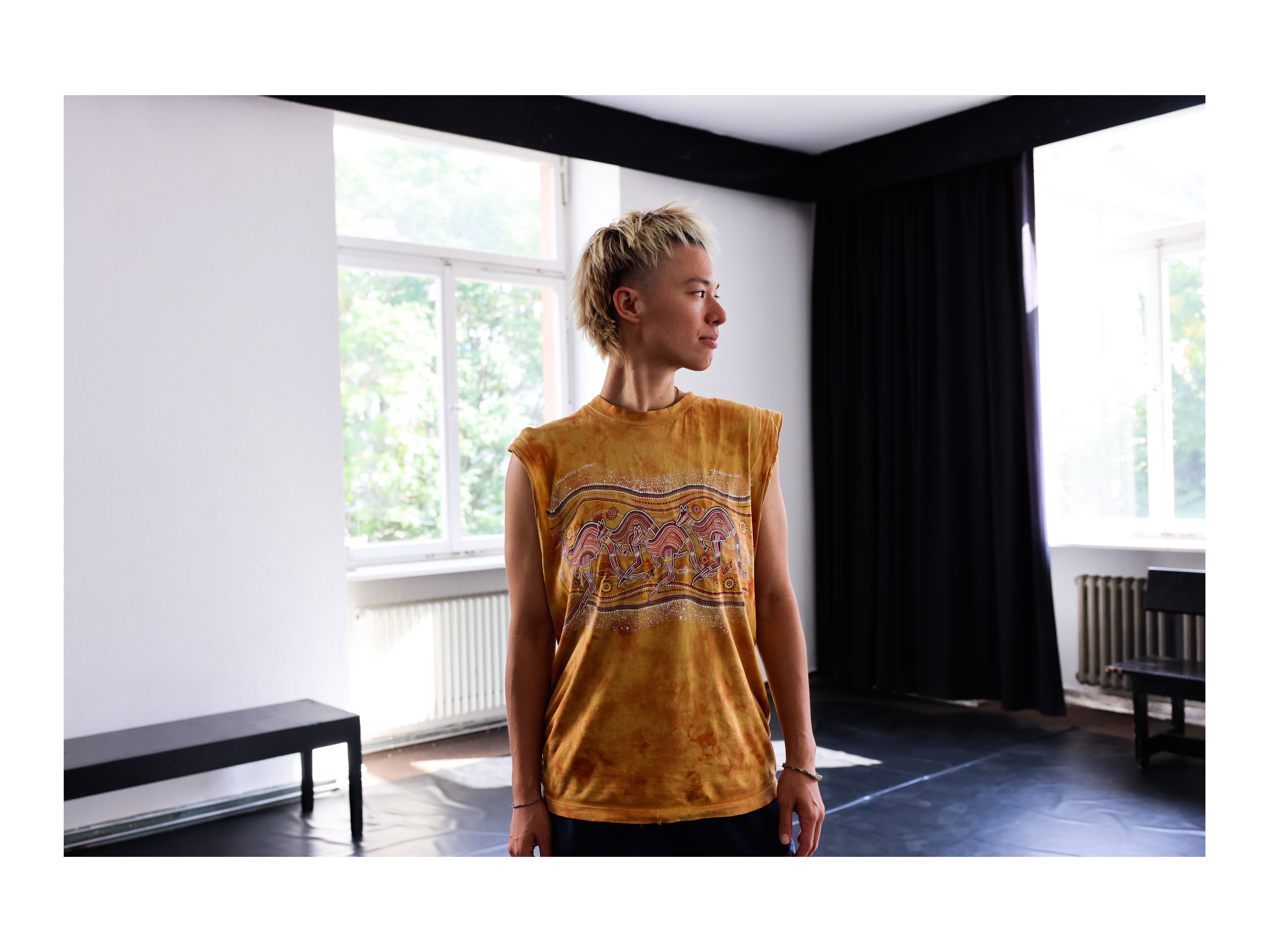
DE
Tara Jade Samaya ist australische Künstlerin, die in Antwerpen, Belgien, lebt und lokal und international in den Bereichen Tanz, Film und Performance arbeitet. Seit kurzem arbeitet sie als Probenleiterin beim Opera Ballet Flanders, Jan Martens' "Futur Proche" war ihre erste Produktion für das Festival Cour d'honneur in Avignon 2022. Zuvor tanzte sie beim Staatsballett Berlin als Solotänzerin in Plateau Effect (Jefta Van Dinter) und Sunny (Emmanual Gat). 2019 gewann Tara die Helpmann und Greenroom Awards als beste Tänzerin in Australien für Chunkymoves' Common Ground (Anouk Van Dijk). Tara hat auch für die Kompanien Australian Dance Theatre und Dance North sowie für unabhängige Künstler*innen wie Prue Lang, Douglas Wright, Lina Limosani und Al Seed gearbeitet. Sie wurde 2016 zur künstlerischen Mitarbeiterin von Chunky Move ernannt und entwickelte die Tanzfilm-Kollaboration mit ihrer Partnerin Pippa Samaya weiter. Ihre gemeinsame Kurzfilm-Performance "Im Here Now" mit den Tänzer*innen Jenna Fakhoury und Paul Vickers wurde an der Komischen Oper Berlin aufgeführt. Sie sind zweimalige Gewinner des internationalen 60-Sekunden-Tanzfilmwettbewerbs (Finnland/Dänemark), des besten Films beim FAD-Filmfestival in den USA, des besten Tanzfilms bei den Australian Dance Awards und des besten experimentellen Kurzfilms bei den Berliner Filmfestspielen.
EN
Tara Jade Samaya is an Australian artist based in Antwerp, Belgium and works locally and internationally in dance, film and performance. Recently she joined Opera Ballet Flanders as rehearsal director with Jan Martens 'Futur Proche' being her premiere production for the Cour d'honneur in Avignon festival 2022. Previously she danced with Staatsballett Berlin as a soloist dancer performing Plateau Effect (Jefta Van Dinter) and Sunny (Emmanual Gat). In 2019, Tara won Helpmann and Greenroom Awards for Best Female Dancer in Australia for Chunkymoves' Common Ground (Anouk Van Dijk). Tara has also worked for companies Australian Dance Theatre and Dance North and independent artists including Prue Lang, Douglas Wright, Lina Limosani and Al Seed. She was appointed Chunky Move’s Artistic Associate 2016 and developed further her dance film collaborative with partner Pippa Samaya. The Samaya Wives short film performance 'Im Here Now' with dancers Jenna Fakhoury and Paul Vickers, performed at Komische Opera Berlin. They are two time winners of the International 60 second dance film competition (Finland/Denmark), Best film in FAD film festival USA, Best dance on Film at Australian Dance Awards and Best Experimental Short at the Berlin Film Festival.
KATJA
KATJA
DE
"Du fängst an, dich mit anderen zu vergleichen, denen es scheinbar besser geht als dir, du fragst dich: 'Warum ist es für die so einfach? Warum haben sie nicht diese Probleme, die ich mit meinem Körper habe?' Dann siehst du einen anderen Körper, einen Körper, der verschwindet, weil er zum Beispiel in einem Krankenhaus liegt, und dir wird klar, dass manche Menschen mit ganz anderen Dingen kämpfen. Eigentlich ist mein Körper sehr privilegiert."
...
"Ich merke: Es ist nicht nur meine Hüfte, die nicht mehr so funktioniert, wie sie sollte - es gibt einfach einige Dinge, mit denen ich im Laufe der Jahre zu kämpfen habe."
...
"Als ich anfing, mit meinem ersten Freund auszugehen, und ich anfing, die Pille zu nehmen - da wurde es wirklich desaströs."
...
"Manchmal mache ich einfach ein Ritual für ein unbekanntes Wesen, das wahrscheinlich auf subatomare Weise diese verdammt geniale, verrückte Schöpfung mit all ihren verschiedenen Formen und Dingen geschaffen hat, die eigentlich gut sind."
EN
"You start to compare yourself with others that seem to be better than you, you ask: 'Why is it so easy for them? Why don't they have these problems that I have with my body?' Then, you see another body, a body, that's vanishing because it's in a hospital for example and you realize, some people are fighting completely different things. Actually my body is very privileged."
...
"I realize: It's not just my hip that is not working anymore as it should - there are just some things I have to deal with over the years."
...
"When I started to date my first boyfriend and I started to take the birth control pill - that's where it got really disastrous."
...
"Sometimes I just do a ritual for an unknown entity that probably in a subatomic way built this fucking awesome crazy creation with all its different shapes and things, that are actually good."
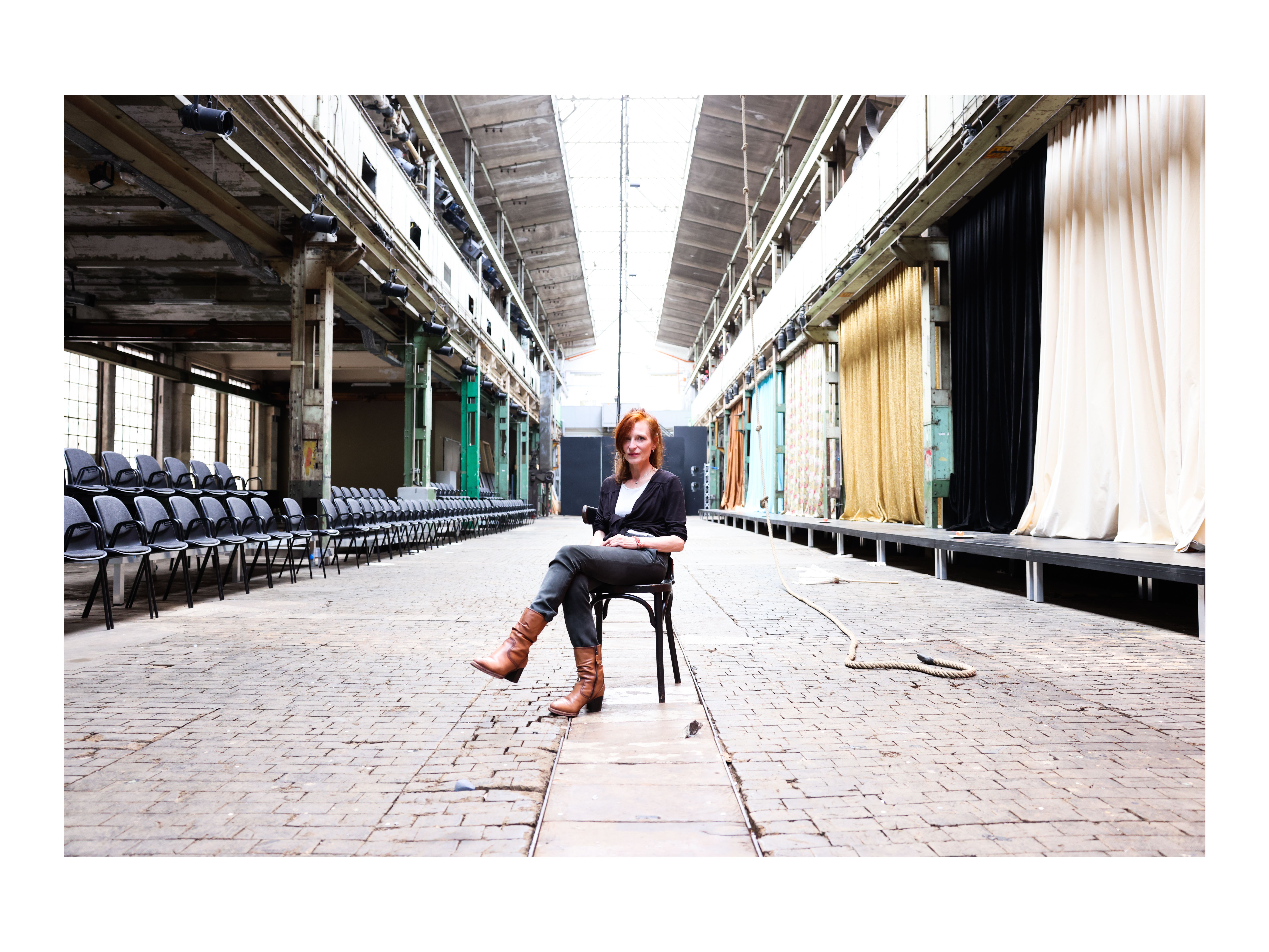
DE
Katja Gaudard wurde in Basel geboren und erhielt ihre Ausbildung zur Tänzerin am Centre de Danse Rosella Hightower in Cannes, bevor sie nach weiteren Ausbildungen in London und Paris ihr erstes Schauspiel-Engagement am Luzerner Theater annahm, sowie Engagements in Montreux und Basel. Seit 2019 lebt sie in Berlin, wo sie zuletzt in "Der Widersprüchliche" am Humboldtforum in der Regie von Clemens Bechtel und in der Choreographie von Maura Morales zu sehen war, sowie aktuell am Staatsschauspiel Dresden in "Unten am Fluss" unter der Regie von Tom Kühnel. Sie war bis Juli 2021 Teil des Ensembles der Berliner Volksbühne, wo sie bis Juli 2021 in Produktionen von Claudia Bauer, Lucia Bihler, Thorleifur Örn Arnasson und Alexander Eisenach spielte. 2011 bis 2019 war sie festes Ensemblemitglied am Staatstheater Hannover und arbeitete dort mit Lars Ole Wahlburg, Heike Maria Götze, Martin Laberenz, Lukasz Twarkowsky, Mina Salehpour, und Anna Bergmann. Seit 2017 realisiert sie eigene transdisziplinäre Projekte, insbesondere mit dem Musiker Lyhre. Katja Gaudard ist 54 Jahre alt und hat eine Tochter.
EN
Katja Gaudard was born in Basel and trained as a dancer at the Centre de Danse Rosella Hightower in Cannes before taking up her first acting engagement at the Lucerne Theater after further training in London and Paris, and engagements in Montreux and Basel. Since 2019 she lives in Berlin where she can be seen most recently in "Der Widersprüchliche" at Humboldtforum directed by Clemens Bechtel and choreographed by Maura Morales, and currently at Staatsschauspiel Dresden in "Unten am Fluss" directed by Tom Kühnel. She was part of the Volksbühne ensemble until July 2021, performing in productions by Claudia Bauer, Lucia Bihler, Thorleifur Örn Arnasson, and Alexander Eisenach. 2011 to 2019 she was a permanent ensemble member at Staatstheater Hannover where she worked with Lars Ole Wahlburg, Heike Maria Götze, Martin Laberenz, Lukasz Twarkowsky, Mina Salehpour, and Anna Bergmann, among others. She has been realizing her own transdisciplinary projects since 2017, especially with the musician Lyhre. Katja Gaudard is 54 and has a daughter.
HEND
HEND
DE
"Man kann das Politische nicht vom Körperlichen und vom Persönlichen trennen. Wenn man wegen seines Aussehens anders behandelt wird, wirkt sich das auf den Körper aus, darauf, wie man atmet, darauf, wie man sich aufrichtet, wie man im Zug sitzt, wie man mit den Leuten spricht."
...
"Ich denke, wenn Männer mit Bauchtanz anfangen würden, würden sich viele Probleme lösen."
...
"Alter ist ein sehr wichtiger Faktor, denn alles verändert sich - was man will, was man sich wünscht. Man muss sich wirklich selbst begegnen, um sich zu verändern. Ich bin froh, auf dem Weg zu sein. Ich bin froh, mir selbst zu begegnen."
...
"Sie lernen dich nicht kennen. Sie lernen nur deine Haut kennen."
EN
"You cannot separate what is political from what is physical and what is personal. When you are treated differently because of how you look, it affects the body, it affects how you breath, it affects how you straighten your back, how you sit in the train, how you talk to people."
...
"I think if men would start belly dancing lots of things would be solved."
...
"Age is a very big element, because everything is changing - what you want, what you wish for. You have to really meet yourself to change. I am happy to be on the way. I am happy to meet myself."
...
"They don't meet you. They just meet your skin."

DE
Hend Elbalouty ist Choreografin, Performerin und Autorin und lebt in Köln. Sie hat einen MA in Performing Arts der Kunsthochschule für Medien, einen BA in Produktionsdesign vom Institut für Kinostudien in Ägypten und einen Abschluss in zeitgenössischem Tanz absolviert. Kürzlich war sie Teil des internationalen Forums des Theatertreffens 2022 in Berlin. Als Teil ihres Abschlusses untersuchte sie die Beziehung zwischen Kunst und sozialer Klasse und kreierte eine Performance, inspiriert durch den lokalen Straßentanz und die Musik in Ägypten (Maharagant), für die sie mit dem Großen Kunstpreis der KHM 2021 ausgezeichnet wurde. Ihr Interesse gilt den Tabus rund um body und race und die Fälschung von Geschichte. Sie arbeitet in der unabhängigen Kunstszene und es ist ihr ein Anliegen, in Arbeiten mitzuwirken oder sie selbst zu produzieren, die soziales Bewusstsein schaffen, wobei sie ständig die Rolle des Tanzes als Instrument zur Stärkung des Individuums und zur Förderung vernachlässigter Ausdrucksformen erforscht.
EN
Hend Elbalouty is Choreographer, Performer and Author, living in Cologne. She holds a MA in Performing Arts from Kunsthochschule für Medien, a BA in production design from the Institute of Cinema Studies in Egypt and a three years degree in contemporary dance. Recently she was part of the internationales Forum of Theatertreffen 2022 in Berlin. As part of her graduation process she researched the relation between art and social class, creating a performance inspired by the local street dance and music in Egypt (Maharagant) for which she was awarded the Große Kunstpreis der KHM in 2021. Her interests reflect on taboos surrounding the body, race and the forgery of history. Working within the independent art scene, she strives to produce and participate in socially aware dance pieces, constantly exploring the role of dance as a tool to empower the individual and bring out those neglected modes of expression.
MAISIE
MAISIE
DE
"Ich möchte meinen Körper als Tochter, als Schwester, als Freundin, als wachsende Frau wahrnehmen."
...
"Es war eine ganz innere Stimme, sehr präsent, konstant, eine tägliche innere Stimme, die sagte: Du siehst nicht aus wie eine Tänzerin. Ich weiß wirklich nicht, wie sie in meinen Kopf gekommen ist. Und sie ist immer noch da, diese Stimme."
...
"Mein Körper ist vererbt. Er ist nicht unbedingt nur ich. Er ist mir gegeben worden."
...
"Für mich ist das Gefühl der Freude am Tanzen das Wichtigste. Das soll der Anlass für meine Arbeit als Tänzerin sein."
EN
"I would like to perceive my body as a daughter, as a sister, as a friend, as a growing woman."
...
"It was a completely internal voice, very very present, constant, a daily internal voice that said: You don’t look like a dancer. I really don’t know how it got into my head. And it’s still there, that voice."
...
"My body is inherited. It is not necessarily just me. It has been given to me."
...
“For me the feeling of joy in dancing is the most important thing. I want that to be the motive of the work I am doing as a dancer.“
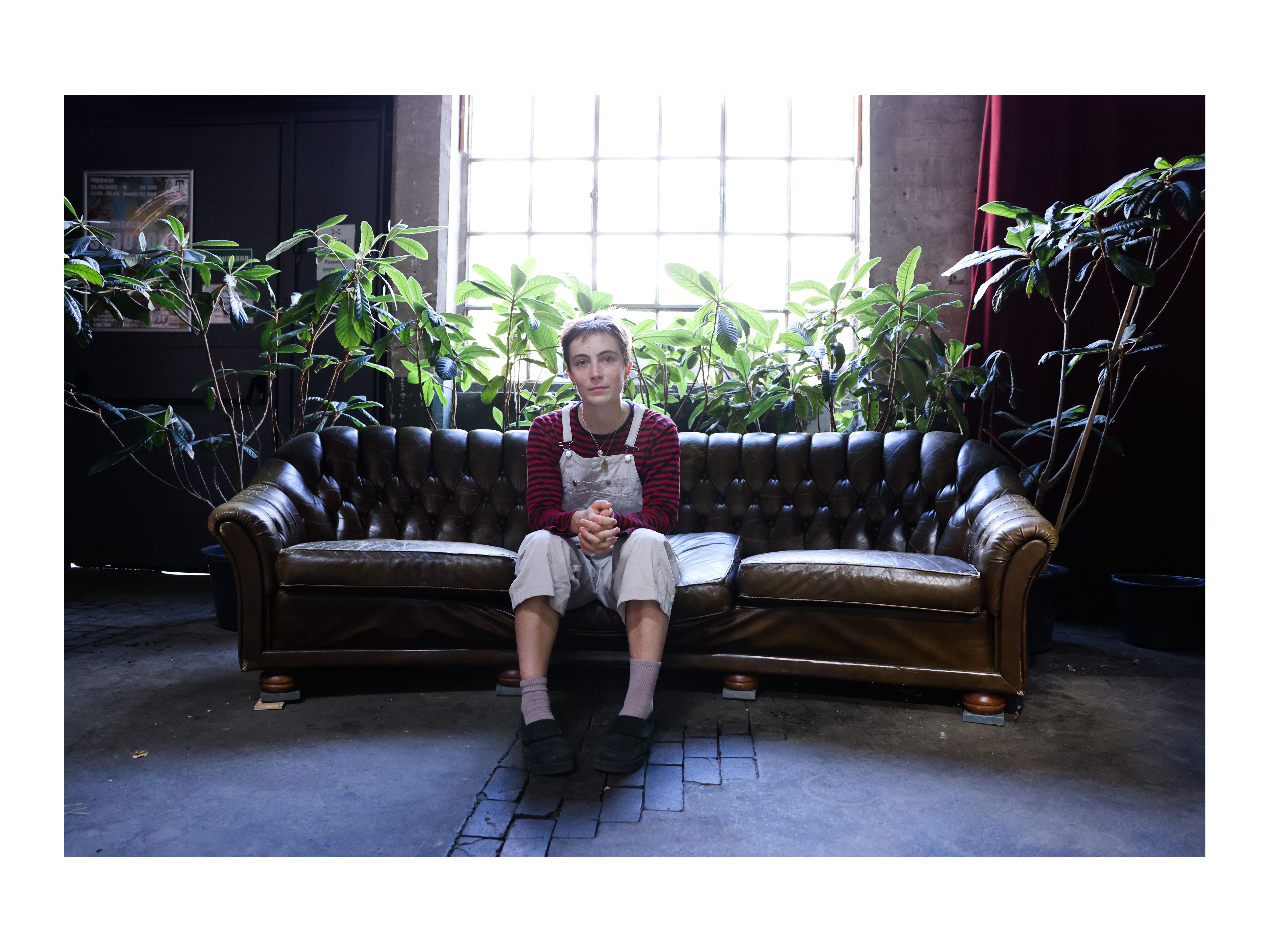
DE
Maisie Woodford (sie/ihr) hat kürzlich ihr Tanzstudium am Königlichen Konservatorium von Antwerpen abgeschlossen und arbeitet nun dort als freischaffende Tänzerin und Performerin. Geboren und aufgewachsen in London, begann Maisie ihre Ausbildung an der London Contemporary Dance School (The Place) und war Mitglied der National Youth Dance Company, wo sie landesweit mit der Choreografin Sharon Eyal in ihrem Stück Used to Be Blonde arbeitete und auftrat. Seitdem hat sie eine Zweitbesetzung bei Jan Martens und dem GRIP-Team in seinem neuesten Stück Any Attempt Will End in Crushed Bodies and Shattered Bones gefunden, mit dem sie 2022/23 auf Tournee gehen wird. Sie interessiert sich sehr für komödiantische und theatralische Arbeiten und stellt die Freude an der Bewegung in den Mittelpunkt von Kreation und Performance.
EN
Maisie Woodford (she/her) is a recent dance graduate from the Royal Conservatoire of Antwerp, and is now based there working as a freelance dancer and performer. Born and raised in London, Maisie began her training at the London Contemporary Dance School (The Place), and was a member of the National Youth Dance Company, working and performing nationally with choreographer Sharon Eyal in her piece Used to Be Blonde. Since then she has found her way to an understudy role with Jan Martens and the GRIP team in his recent work Any Attempt Will End in Crushed Bodies and Shattered Bones, which she will tour in 2022/23. She is greatly interested in comedic and theatrical work, and placing the joy that movement brings at the centre of creation and performance.
AMELIA
AMELIA
DE
"Der Wettbewerb sollte der Antrieb sein. Das ist der Grund, warum man seinen Körper verändern will. Deshalb bekommt man eine Essstörung - und das funktioniert auch noch. Das ist das Verrückte daran. Man wird beklatscht, wenn man abnimmt."
...
"Ein rassifizierter, politisierter Körper zu sein und dazu noch sexualisiert und fetischisiert - ich fühlte mich weniger menschlich. Ich hatte einfach das Gefühl, dass mir meine Menschlichkeit genommen wurde. Mein Wert beruhte darauf, welche Art von Erregung mein Fleisch in einem anderen Körper erzeugen kann. Das war für mich einfach ekelhaft."
...
"Betrachten Sie den Körper als ein Territorium, ein Ökosystem, und denken Sie daran, wie unsere Gesellschaft den Planeten behandelt hat; wir extrahieren und kontrollieren. Die Art und Weise, wie wir in unsere Umwelt eingegriffen haben, ist auch eine Metapher für diese Mentalität des Eingriffs in den Körper."
...
"Was sage ich zu meinem Körper, wenn ich mich im Spiegel betrachte? Wie kümmere ich mich um mein Wohlbefinden und setze Prioritäten?"
EN
"The competition was supposed to be the motivator. That's why you want to change your body. That's why you get an eating disorder - and it's also successful. That's the messed up part. You get applauded when you lose weight."
...
"Being a racialized, politicized body and on top of that sexualized, fetishized - I felt less human. I just felt like my humanity was stripped away from me. My value is built on what kind of excitement my flesh can produce in another body. That for me just felt disgusting."
...
"Look at the body as a territory, an ecosystem, and think of how our society has treated the planet; we are extracting and controlling. The ways that we have intervened in our environment is also a metaphor for this mentality of intervening the body."
...
"What are the messages that I say to my body when I look at myself in the mirror? How do I take care of my wellbeing and prioritize it?"

DE
Amelia Uzategui Bonilla wurde 1985 in Lima, Peru, geboren. Sie absolvierte ihren Bachelor in Tanz an der Juilliard School und einen Master an der Hochschule für Musik und Darstellende Kunst Frankfurt am Main (HfMDK). Als Tänzerin, Pädagogin und Regisseurin leitet Amelia Tanzprojekte, die das Bewusstsein für Themen wie Klimagerechtigkeit, Vormachtstrukturen, Tradition/Zeitgenossenschaft und Gemeinschaftspflege schärfen sollen. Sie ist außerordentliche Professorin und unterrichtet derzeit zeitgenössische Tanztechnik an der HfMDK Frankfurt und ist Co-Leiterin des ID_Tanzhauses Frankfurt Rhein-Main von ID_Frankfurt.
EN
Amelia Uzategui Bonilla was born in 1985 in Lima, Peru. She completed her Bachelor in Dance at Juilliard and a Masters at the Hochschule für Musik und Darstellende Kunst Frankfurt am Main (HfMDK). As dancer, educator, and director, Amelia leads dance projects that raise awareness on issues such as climate injustice, supremacist structures, tradition/contemporaneity, and community care. She is an associate professor, currently teaching contemporary dance technique at the HfMDK Frankfurt and co-directs ID_Frankfurt's ID_Tanzhaus Frankfurt Rhein-Main.
MAGDA
MAGDA
DE
Wichtiger Hinweis: Wir haben im Prozess unter anderem Essstörungen thematisiert und dieses Thema auch visuell umgesetzt.
EN
Content Warning: Eating disorders has been a theme of discussion in our process, and has also been visually transformed into the work.
DE
"Manchmal muss ich ehrlich zu mir selbst sein und zugeben: Ich bin nicht immer selbstbewusst. Es gibt Zeiten, da habe ich keine Ahnung, keine Vorstellung von mir selbst. Und das ist auch in Ordnung."
...
"Das Stück 'Shake' war eine Art Therapiestück für mich. Es hat meinen Prozess der Akzeptanz gegenüber meinem Körper vorangebracht. Die Bewegung ist so aufregend, vor allem mein Fett zu schütteln bringt mir so viel Freude!"
...
"Die neue Herausforderung für meinen Körper ist es, ein Kind zu ernähren. Ich habe mich in letzter Zeit nicht durch meine Workouts gepusht, ich war eher damit beschäftigt, die perfekte Haltung für das Stillen zu finden. Aber ich weiß, dass das bei anderen Müttern nicht so sein muss. Vor allem als Tänzerin ist es doppelt so schwer, weil man auf seinen Körper und seine Form angewiesen ist."
...
"Ich habe von Menschen in der Tanzausbildung gehört, die aufgrund von Essstörungen gestorben sind. Das ist etwas, worüber wir reden müssen."
EN
"Sometimes I have to be honest with myself and admit: I'm not confident all the time. There are some times where I don't have a clue, any idea about myself. And that's okay too."
...
"The piece 'Shake' was kind of a therapy piece for me. It brought forward my process of acceptance towards my body. The movement is so exciting, especially to shake my fat brings me so much joy!"
...
"My body's new challenge is to feed a child. I didn't push myself through my workouts lately, I was rather busy with finding the perfect posture for breastfeeding. But I know for other mothers it's not necessary like this. Especially when you are a dancer it's twice as hard because you are dependent on your body and its shape."
...
"I heard of people in dance education who died because of eating disorders. It's something we have to talk about."
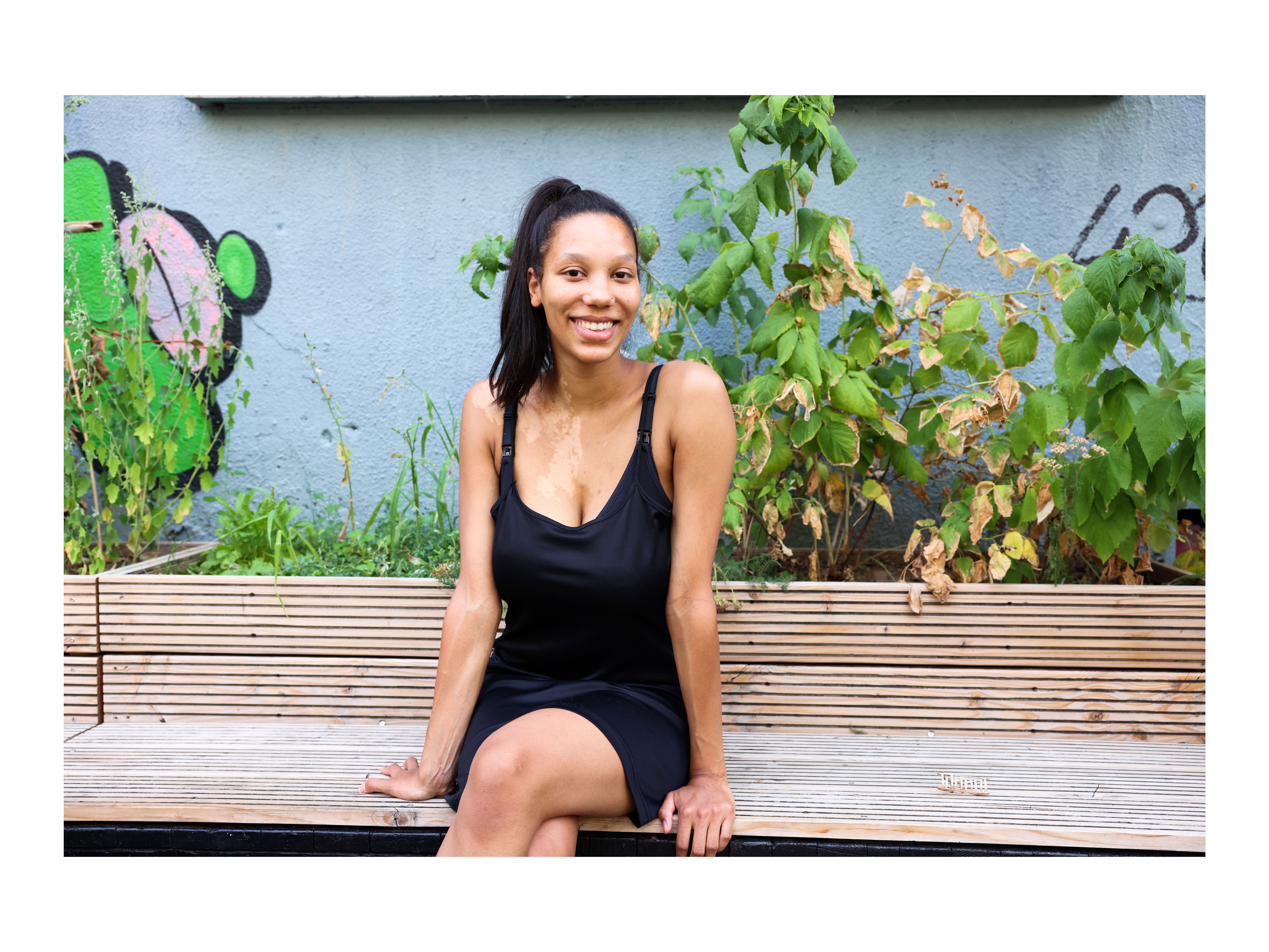
DE
Magdalena Dzeco ist zeitgenössische Tänzerin und Choreografin. Sie absolvierte ihr Tanzstudium an der Palucca Hochschule für Tanz Dresden, der AHK Amsterdam und schloss mit einem BA an der HfMDK in Frankfurt am Main ab. 2022 erhielt sie ihren Master of Arts an der HU Berlin. Sie arbeitet mit der Gunter Hampel Music and Dance Improvisation Company, Billinger und Schulz sowie Künstler*innen aus anderen Disziplinen u.a. Film, Schauspiel, Musik und der bildenden Kunst zusammen. Sie ist ein Gründungsmitglied des SphereCollective.
EN
Magdalena Dzeco is a contemporary dancer and choreographer. She studied dance at the Palucca Hochschule für Tanz Dresden, the AHK Amsterdam and graduated with a BA from the HfMDK in Frankfurt am Main. 2022 she graduated for her MA at Humbold University Berlin. She works with the Gunter Hampel Music and Dance Improvisation Company, Billinger und Schulz and artists from other disciplines including film, acting, music and the visual arts and is founding member of SphereCollective.
YANEL
YANEL
DE
“Wenn ich dasselbe wie andere mache, dann sieht es nicht so aus, wie es bei den anderen aussieht. Ich habe nicht die gleiche Flexibilität. Deshalb habe ich immer versucht, das Ballett und die Techniken an meinen Körper anzupassen, und versuche es immer noch.”
...
"Natürlich gab es immer diese dunkle Stimme in mir, die sagte: Das ist zu viel Arbeit. Tu's nicht. Gib auf."
...
"Manche Leute sind süchtig nach Kaffee oder Zigaretten, aber Omar und ich, wir sind süchtig nach Kostümen."
...
"Was passiert mit Menschen mit Behinderungen in unserer Gesellschaft, wenn sie keine Assistent*innen bekommen? Wir wollen das nicht, aber wir sind darauf angewiesen, dass uns jemand hilft. Wir mögen es nicht, aber wir haben das Gefühl, dass wir der Gesellschaft zur Last fallen, und das beeinflusst natürlich unser Leben."
EN
“When I do what others do, it looks different. I don’t have the same flexibility. So I have always tried and am still trying to adapt ballet and the techniques to my body”
…
“Of course there has always been this dark voice inside of me that says: it’s too much work. Don’t do it. Give up."
…
“Some people are addicted to coffee or cigarettes, but Omar and me, we are addicted to costumes.”
…
“What happens to people with disabilities in our society, when they don’t get an assistant? We don’t want to, but we depend on somebody helping us. We don’t like it but we feel like we are a burden to society and of course this influences the way we live our life.”

DE
Yanel Barbeito Delgado wurde 1972 in Kuba geboren und arbeitet als professioneller Tänzerin, Choreografin und Dozentin. Yanel lebt seit ihrer Geburt mit einer zerebralen Lähmung. Sie tanzt für Kompanien, Theater und Fernsehen in Deutschland, Österreich, Spanien und Kuba - meist zusammen mit Tänzer*innen ohne körperliche Behinderung. Yanel studierte Theaterwissenschaften und Tanz an der Universität der Künste in Havanna, Kuba.
EN
Yanel Barbeito Delgado was born 1972 in Cuba and works as a professional dancer, choreographer and lecturer. Yanel is living with cerebral palsy since birth. She dancers for companies, theatres and television in Germany, Austria, Spain and Cuba - mostly together with dancers without physical disabilities. Yanel studied theatre studies and dance at the University of Arts in Havana, Cuba.
more information
more information
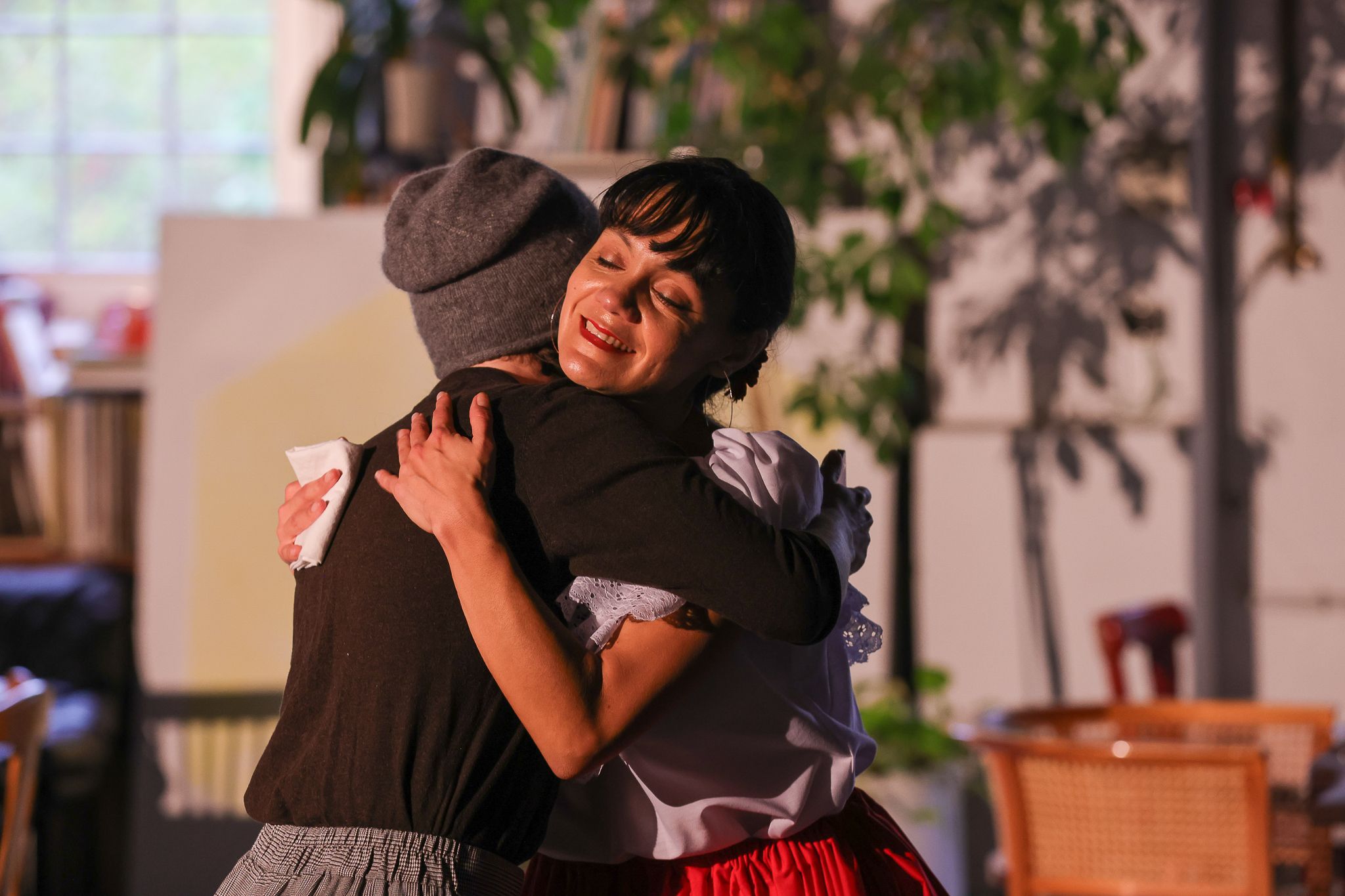
DE
Auf den Aufruf von gossips, der Tänzerinnen einlud, sich für einen dokumentarischen Prozess mit Gesprächen, Interviews und einem Video-Dreh zu bewerben, meldeten sich im Sommer 2022 über 100 Tänzer*innen. Das Bedürfnis, in der Tanz-Szene und besonders als weiblich gelesene Person über die Beziehung zum eigenen Körper zu sprechen, war überwältigend. Die Tänzerinnen Yanel Barbeito Delgado, Magdalena Dzeco, Hend Elbalouty, Katja Gaudard, Tara Jade Samaya, Amelia Uzategui Bonilla und Maisie Woodford wurden schließlich eingeladen, Teil des Prozesses zu sein. Auf Basis von biographischen Erfahrungen und Reflektionen und Überlegungen (angestoßen durch lange Vorgespräche und intensive Interviews) entwickelten wir mit jeder Tänzerin und gemeinsam mit dem Film-Team De-Da Productions und der Komponistin und Musikern Miriam Berger je ein choreographisches Tanz-Portrait, innerhalb dessen jede Tänzerin Teile ihrer subjektiven Geschichte vertanzt, die gleichzeitig weit über die individuelle Erfahrung hinausweist und einen Beitrag zum Diskurs über Körper-Normen, Leistungsdruck und (gegenderte) Schönheitsideale auch außerhalb der Tanzszene leistet.

EN
In response to the open call from gossips inviting female dancers to apply for a documentary process with talks, interviews and a video shoot, over 100 dancers came forward in the summer of 2022. The need to talk about the relationship to one's own body in the dance scene, especially as a person read as female, was overwhelming. The dancers Yanel Barbeito Delgado, Magdalena Dzeco, Hend Elbalouty, Katja Gaudard, Tara Jade Samaya, Amelia Uzategui Bonilla and Maisie Woodford were finally invited to be part of the process. On the basis of biographical experiences and reflections (initiated by long preliminary discussions and intensive interviews), we developed a choreographic dance portrait with each dancer that was realised together with the film team De-Da Productions and composer and musician Miriam Berger, within which each dancer shows parts of her subjective story, but at the same time points far beyond the individual experience and contributes to the discourse on body norms, performance pressure and (counter-gendered) ideals of beauty also outside the dance scene.
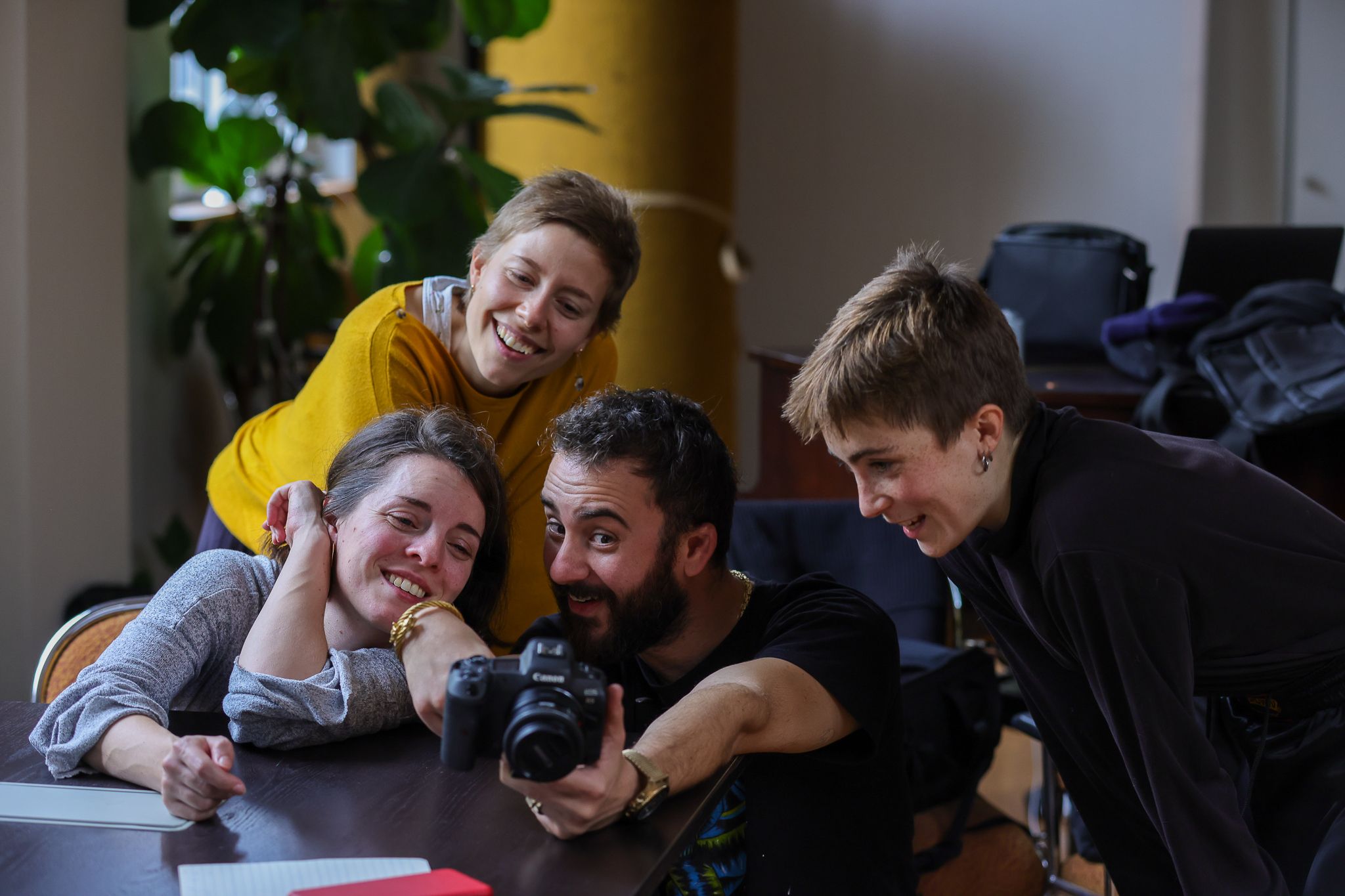
credits
credits
Dance / Choreography: Yanel Barbeito Delgado / Magdalena Dzeco / Hend Elbalouty / Katja Gaudard / Tara Jade Samaya / Amelia Uzategui Bonilla / Maisie Woodford
Concept: Gal Fefferman, Anno Bolender, Julia Hagen, Katelyn Skelley, De-Da Productions, in collaboration with Yanel Barbeito Delgado / Magdalena Dzeco / Hend Elbalouty / Katja Gaudard / Tara Jade Samaya / Amelia Uzategui Bonilla / Maisie Woodford
Artistic direction / Choreography: Gal Fefferman
Dramaturgy: Julia Hagen
Production: Anno Bolender
Film: De-Da Productions
Music: Miriam Berger
Text - Katja’s Portrait: Katja Gaudard
Lyrics - Amelia’s Portrait: Amelia Uzategui Bonilla
Melody - Amelia’s Portrait: El Gato Blanco (Author unknown)
Performance - Amelia’s Portrait: Amelia Uzategui Bonilla, Miriam Berger, Magdalena Dzeco, Julia Hagen, Gal Fefferman
Clarinet - Hend’s Portrait: Mario Neuman
Consultation: Katelyn Skelley
Choreographic Assistance: Evie Poaros
Translation: Alexandra Morales, Guillermo de la Chica López
Personal Assistance to Yanel Barbeito Delgado: Omar Goméz
Special thanks to Alexandra Morales
Produziert in Kooperation mit studioNAXOS. Unterstützt durch das NATIONALE PERFORMANCE NETZ - STEPPING OUT, gefördert von der Beauftragten der Bundesregierung für Kultur und Medien im Rahmen der Initiative NEUSTART KULTUR. Hilfsprogramm Tanz. Unterstützt durch das Kulturamt der Stadt Frankfurt am Main.
Weitere Unterstützung durch das Schauspiel Frankfurt, die Oper Frankfurt und die alte Seilerei.


